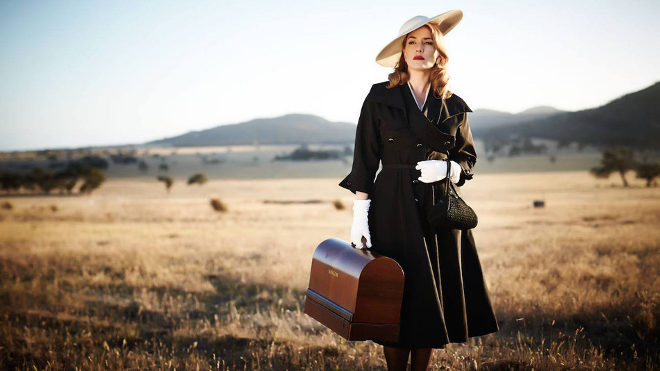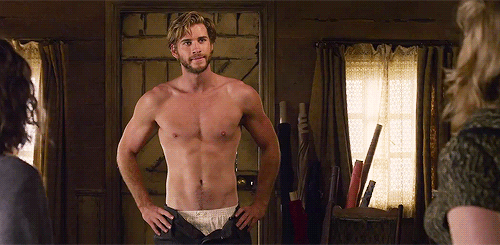Review: ‘The Dressmaker’ Is An Unexpected Return To The Glory Days Of Australian Comedy
Don't judge the film by its (extremely boring) poster.

The poster for The Dressmaker features Kate Winslet, the epitome of elegance, standing amid the golden brown of the Australian bush, dressed in a chic black coat with delicate white gloves, a wide-brimmed hat tilted ever so slightly and a small black purse draped over her wrist.
She looks like a Parisian fashionista, her skin pail and porcelain and perfect. The title itself suggests a regality akin to a serious Oscar-bait literary adaptation from the Merchant Ivory powerhouse, starring Keira Knightley, Emma Thompson and/or Helena Bonham Carter.
Basically, it looks classy.

One could be forgiven for thinking Jocelyn Moorhouse’s film – her first in 18 years, and her first local production since the masterpiece Proof (1991) – is a return to the days of Australian filmmaking where lace, petticoats, parasols, and corsets were the name of the game. An era when, as Mad Max director George Miller puts it, we were “revisiting our history through our cinema.” Films like My Brilliant Career (1979), The Getting of Wisdom (1978), Picnic at Hanging Rock (1975), The Man From Snowy River (1982), and The Thorn Birds (1983) were all critically acclaimed, and saw the burgeoning local industry find international success in the revival of the woman’s melodrama — a genre that had long since fallen out of vogue in Hollywood.
The surprise of The Dressmaker is that it’s nothing like that at all. Oh sure, its story — of a stunningly beautiful couturier who returns home to a one-street town in the Australian bush to give everyone make-overs, while seeking out the truth of her childhood and finding love in the arms of a handsome farmer — has all the trademarks of a three-hanky weepie. But what if I told you Moorhouse’s film is pitched to the rafters, crass and full of whiplash-inducing tonal shifts, unafraid of thrusting its heaving bosom in the faces of an audience expecting a polite movie with frilly costumes.
There a police sergeant in drag, a slut-shaming hunchback, a rival couturier, and Gilbert and Sullivan’s The Mikado. It’s madness.
This all makes more sense considering that it’s co-written by Moorhouse’s husband, P.J. Hogan. Like Hogan’s own Muriel’s Wedding (1994) as well as The Adventures of Priscilla, Queen of the Desert (1994), Strictly Ballroom (1992), Cosi (1996), and Welcome to Woop Woop (1997), The Dressmaker wouldn’t have been out of place in the rash comedies of the 1990s; it revels in a distinctly Australian form of comedy that is as unrepentantly daggy as it is proudly grotesque and boastfully Aussie-centric, full of thick accents and inside Aussie-isms. It’s warped and it’s wicked, and it’s what makes Moorhouse’s film stand out from the crowd.
Many of these films are over-the-top and kitsch, frequently queer and/or female-centric. They are a far cry from the oh-so-serious masculine crime and war dramas like Gallipoli (1981), Breaker Morant (1980), Animal Kingdom (2010), Chopper (2000), The Boys (1998), Two Hands (1999), and Snowtown (2011) that occupy much of the historical critical discourse around Australian film — yet they’re the most Australian of all. Many will likely be turned off by how proudly and patriotically The Dressmaker lets its freak flag fly, but it hopefully signals a return of Australian movies embracing the weird and sublimely feral parts of our culture, after years of shame in our comedic voice.
Say No To Cultural Cringe
2015 has been a record year for local productions, with big box office takings that will hopefully extend to The Dressmaker, multicultural rom-com Alex and Eve, and the forthcoming Now Add Honey from the creative team behind The Librarians and Upper Middle Bogan. Throw in last year’s The Mule, and it’s a resurgence of Aussie cinematic comedy that suggests we’re fine with embracing our cultural cringe and laughing at ourselves — so long as the product is good.
Consider the cautionary tale of Josh Lawson, who disparaged home-made films last year before the release of his directorial effort The Little Death: “If you are an Australian who doesn’t like Australian films, this is the film you should watch. Because neither do I.” That film went out of its way to not feel Australian, and subsequently flopped critically and commercially.
Not because of a prejudice against Australian film like Margaret Pomeranz suggested; it flopped because it wasn’t funny.
While not attempting to be as overtly funny as the more straightforward comedies, the theatricality of films by George Miller and Baz Luhrmann have their own uniquely comedic flare and have been met with extraordinary results, despite being at times even embarrassingly fair dinkum. Luhrmann especially has been glitter-bombing audiences since he broke out with Strictly Ballroom (1992); he followed that with equally mad cap Aussie-made confections like Moulin Rouge! (2001), Australia (2009) and The Great Gatsby (2013), which all infuse passionate romances with strange Looney Tunes slapstick. Despite the chorus of mixed reactions that greets every single one of his films, audiences eat them up; every one of his local productions is in the top ten highest-grossing Australian chart.
Luhrmann certainly wasn’t the first. This brand of Aussie humour stretches back to the days of the ocker comedy of The Adventures of Barry McKenzie (1972) and Alvin Purple (1973), and continued through the next two decades of genre and sexploitation films like Mad Dog Morgan (1976) and Australia After Dark (1975). Even Gillian Armstrong followed her poetic Oscar-nominated My Brilliant Career with a flamboyantly gaudy and daggy candy-coloured musical called Starstruck (1982), a juxtaposition that was dealt with wonderfully in that film’s trailer.
They’re all steeped in a specific localised humour and style that international audiences would likely be confounded by – except for that brief stint in the ‘90s – but which for many Australians is just a normal part of our everyday culture. Like the recent Greek “weird wave” or the deadpan comedies of Scandi cinema, these films have a perspective that is uniquely our own.
Is There A Global Market For This?
The Dressmaker recently played the Toronto International Film Festival to the sort of wildly mixed responses one would expect from such a film. Some quite fairly criticised it as “a hodgepodge of comic melodrama”, an “orchard of absurd” and “tonally bonkers”, and called out Kate Winslet’s “transformation into our wacky, awesome aunt”. Then the Hollywood Reporter rather astutely observed that, “Little here ‘works’ in any traditional sense of that word, but the film boasts enough manic energy and straight-up weirdness to keep you entertained.” SBS quite rightly compared it to its ‘90s brethren and their “sometimes cruel and acidic comic sensibilities, heavy with pastiche and bizarre shifts of tone.”
The film certainly isn’t as deranged as P.J. Hogan’s last feature, the exhaustively gross Mental (2012) wherein Toni Collette and Deborah Mailman spread their period blood all over the pristine white furniture of a germaphobe neighbour. That film failed to reach the critical, commercial or cultural heights of Muriel’s Wedding, but The Dressmaker is softer and more glamourous while delighting in its nostalgic comedic throw-back.
The costumes are spectacular and Oscar-worthy, and the big cast is wonderful, featuring Winslet, Liam Hemsworth and Judy Davis plus an ensemble of recognisable faces like Sarah Snook, Rebecca Gibney, Shane Jacobson, Shane Bourne and Sacha Horler. Davis in particular is deliciously berserk, looking as if she’s been cast in a regional theatre production of Grey Gardens (1975), lusting over Liam Hemsworth’s muscular physique like a horny dame.

The Dressmaker isn’t the classy affair many might initially expect from the woman who once directed a movie called How to Make an American Quilt. But it’s lately felt as if Australian filmmakers have forgotten how to have a big, gut-busting laugh — and what better way to be reminded than with something as darkly ridiculous as this.
–
The Dressmaker is in cinemas from Thursday October 29.
–
Glenn Dunks is a freelance writer from Melbourne. He also works as an editor and a film festival programmer while tweeting too much @glenndunks.

